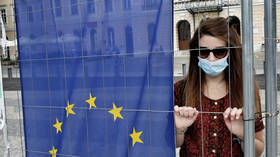The EU’s eye-wateringly expensive Covid-19 rescue plan is likely to only widen the trench between North and South

Brussels has put forward a €750 billion scheme aimed at averting an internal split that could endanger the euro and imperil the whole European project. But it’s fraught with danger and far from certain to work.
The EU Commission has proposed a €750 billion reconstruction plan. The so-called “Instrument for Reconstruction and Resilience” is at the core of it, which the office of EU Commission President Ursula von der Leyen has been working on for weeks.
The name is confusing, because, while fully acknowledging the gravity of the health crisis and the global lockdown, we haven’t been at war – even if some leaders like to use that metaphor. Whoever speaks of war in this situation is ignoring history.
We are, however, in massive limbo, hovering somewhere between quarantine, loss of income, people’s personal dramas, and the biggest recession since 1929.
This is an unprecedented recovery program for the European economy. It is designed to become part of the seven-year EU budget from 2021 to 2027, which will total €1.85 trillion.
The rescue plan is designed, in particular, to support countries that have been severely impacted by the pandemic, such as Italy and Spain, which have hardly any fiscal space to launch their own recovery programmes. Two-thirds of the funds – which are planned to be available from 1 January 2021 until the end of 2024 – would be in grants, which will not need to be repaid. The rest would be loans.
In order to finance this, the Commission wants to take on unprecedented amounts of debt in the financial markets. However, all of this requires authorisation from each of the 27 EU Member States.
Also on rt.com Italy & Spain would receive biggest share of EU’s proposed €750 billion post-Covid recovery fundIt’s still all about the euro
Prior to the EU’s proposal, there was the Macron-Merkel plan, which would have provided €500 billion in grants to the most heavily indebted of their EU partners. It marks a paradigm shift in Berlin, which, on this occasion, clearly supports taking on debt. After all, if Italy and Spain are rescued, the creditors are ultimately those who profit.
At its heart, the plan concerns the EU’s survival. There is a déjà-vu feeling about this crisis, which is similar to the 2010 euro crisis in Greece, but this one presents a more fundamental existential threat.
Economists use the term “periphery states”, to cover Spain, Italy, Greece and Portugal. But it is mistaken, in my opinion. Greece and Italy, in particular, are the core states of our civilisation, the spiritual and political origin of Europe. Yet the trench between the North and South deepens between growing mountains of debt.
All this should remain in people’s minds. At funding events that I attended in Germany during 2014/15 to talk about energy supplies, it was clear to me that the sceptical view that the Northern spendthrifts had of those “wasteful” Southerners was set in stone. Would Brussels or Berlin now deal with Rome or Madrid like they did with Athens? Hardly!
Before the pandemic, Rome was responsible for a quarter of the eurozone’s debt. The third largest economy in the EU not being able to meet its fiscal obligations is a much bigger problem than that of Greece. Italy is “too big to fail”.
The Fitch rating agency has downgraded Italy to “BBB-” – that’s just one notch above being classified as junk. As a result, some institutions are no longer able to invest. “Italy’s mountain of debt will endanger the eurozone,” said the Swiss newspaper Neue Zürcher Zeitung, as public debt reached more than €2,500 billion. The debtors are, in particular, Italian banks.
The Commission’s recovery plan is all about averting an implosion that would impact everyone, endanger the euro and imperil the whole European project. It can’t be allowed to happen. The key, according to the Commission, envisages €300 billion going to Italy and Spain. But the Central and Eastern European countries need to make especially sure that they, too, are not forgotten. And then, a simple question arises: Where will all this new money come from?
Brussels will tax itself
On the one hand, loans will be taken out on the financial market, with low interest rates, and, on the other, this will be dealt with through fiscal policy. Wherever possible, this should be supranational taxation. The European Central Bank, under Mario Draghi’s motto of “whatever it takes”, almost completely exhausted monetary policy measures. His successor, Christine Lagarde, is planning a sleight of hand here, but her diagnosis is gloomy and the outcome uncertain.
The plan is to expand the Emissions Trading Scheme, and to introduce a long-discussed digital tax, as well as a CO2 tax – a compensation mechanism for cheap, environmentally damaging products from abroad. Such a tax could start a trade war.
In addition, there is talk of a plastics levy. The German newspaper Die Welt has warned in an editorial of “phantom taxation”. Such single measures don’t really help the national budget. And the impact of yet another tax burden is questionable, given the already threatened state of many small- and medium-sized companies, which make up the backbone of the economy.
What both citizens and businesses need at this moment is relief. The old maxim still holds true: “No taxation without representation”. How represented do taxpayers feel by the unelected EU Commissioners? And, on top of this unease, many people, especially the self-employed, feel abandoned by their governments during this crisis.
Critics and the bargaining chips
The fiscally conservative member states of Denmark, Sweden, the Netherlands and Austria – dubbed the “Frugal Four” in Brussels – argue that these billions of euros should be granted as loans, which must be repaid. Von der Leyen’s very European compromise – two-thirds in grants, one third in loans – still raises questions. This has to be agreed on by the heads of European states and governments by September at the latest.
EU Budget Commissioner Johannes Hahn has warned against a failure to ratify the package. The Commission can only take on the necessary loans when every parliament in the 27 member states has agreed. In countries such as Belgium, this could mean needing the approval of regional parliaments as well. “There is no Plan B, if a parliament doesn’t ratify it,” said Hahn.
The impending negotiations will therefore be a balancing act of European policy with an uncertain ending. In future, it would have to allow for around 17 percent of the yearly budget to go into debt servicing – something that only the most indebted of countries have ever experienced.
“Every European generation has its own story,” said von der Leyen, as she presented her plan to the European Parliament. Therefore, this effort is to be called “Next Generation EU”.
For many young people today, everything about their future ends with a question mark. Under what conditions can my school or university still run? Are internships possible? Will I ever find a job? And if I do, can I be threatened with unemployment, regardless of performance?
And now we have added another: how will we ever pay for the hundreds of billions spent on trying to fix Europe’s pandemic-ruined economies?
Past generations could rely on more security and more Europe; sadly, the next generation faces a bleaker, more challenging, more indebted, more divided post-Covid-19 Europe.
Think your friends would be interested? Share this story!
The statements, views and opinions expressed in this column are solely those of the author and do not necessarily represent those of RT.















